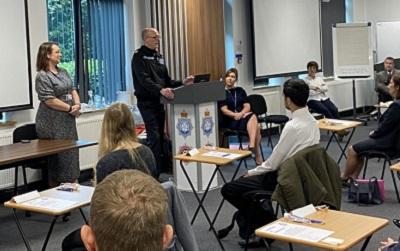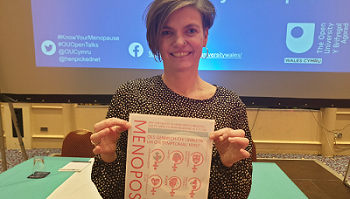People and Organisations

We are a diverse group of academics who research many aspects of work and organisations.
These can be broadly understood as centring on organisation studies and organisational psychology; and management and organisational learning, processes, change and innovation. Members of the department also have an interest in academic practices like research ethics and the politics of knowledge production.
Research into Employment and Equitable Futures
We seek to explore and shape the future direction of equitable futures, work and society with dedicated research into this area. In partnership with The People Space, this academic centre of excellence draws on the Department for People and Organisations' scholarly expertise on themes of identity, leadership, gender, bodies, ethics, power and learning to inform policy makers, organisational leaders, social practitioners and people from across contexts to work together to co-create innovative solutions for meeting these coming opportunities and challenges.
Gendered Organisational Practice
This research cluster takes feminist solidarity as a starting point to create a space where feminists of any gender can share insights and knowledge from academic study and practice. The cluster fosters continuous collaboration and exchange between practitioners and academics and provides a hub for those interested in developing equality through their research, but also for practitioners wanting to make their organisations more egalitarian and fairer places. Current areas of expertise include gendered working bodies, feminist organising and gender and sexuality.
Research interests
Organisation studies and organisational psychology
- Alternative organisations and organising
- Civil society organisations
- Corporate social responsibility
- Critical approaches to leadership and leadership dilemma
- Critical management studies
- Diversity in organisations
- Emotions in organisations
- Employee branding
- Financialisation and political and ethical responses
- Gender, sexuality, the body in organisations and how bodies are organised
- Human-animal relations in organisations
- Individual and group behaviour in organisational contexts
- The interplay between work and health
- Organisational democratic practice
- Organisational and individual identity, subjectivity, selfhood and the meaning of work
- Organisations, work and social inclusion
- Post-colonial relations in organisations
- Power, politics and organisations
- Professional occupations
- Precarious work
- The production, dissemination and contestation of meaning in organisations
- The psychology of financial behaviour
- Risk, uncertainty, and resilience
- Sociological accounts of work
- Transformations in technological and institutional conditions
Management and organisational learning, processes, change and innovation
- Change management
- Cross-cultural differences and self and group regulation in online learning
-
Collective organising and social learning processes
-
Decision-making under radical uncertainty
-
The development of business and management practices
-
Entrepreneurship
-
Formal and informal learning in organisations
-
Green HRM
-
Higher education management
-
Knowledge management
-
Management Information Systems
-
Managing inter-organisational relations in complex services
-
Management practices
-
Operations management
-
Serious games and the contribution of gamification to organisational learning and innovation
-
Strategic change
-
Supply chain management and behaviour
-
Supply chain analytics and modelling
-
Supply chain performance measurement systems
-
Sustainability and resilience in the supply chain
Academic practices
- Embodiment and affect in research
- The politics of academic knowledge production
- Research ethics
- Research methods
Academic Publications
Full details of our research publications can be found on Open Research Online and via our staff pages.
Teaching
Members of the Department teach across undergraduate, postgraduate and executive education modules in areas such as organisational behaviour, management of learning and change, professional development, human resource management, creativity, leadership, innovation, organisational culture and organisational development. We also run the CIPD accredited MSc in Human Resource Management.
Contact the Department for People and Organisations
For all department-related enquiries, please email us.
For all other enquiries, including student and alumni, please visit our contact us page.

Major milestone for North Yorkshire Police and The Open University as first police constable degree apprentices start training
The new officers will combine their practical police officer training course with studying for their Bachelor of Science honours degree in Professional Police Practice, graduating in three years’ time.

Appeal for volunteers for study on working with endometriosis
PhD research student Victoria Williams is exploring the experiences of those working with endometriosis and the influence of menstrual policy.
What do we really need in a crisis? Caring Leadership
In times of crisis, we demand different things from our leaders, organisations and institutions. Crisis situations stir up feelings of helplessness, and reawaken a primal need for nurturing, comfort, strength and guidance. When the world feels unmanageable, we look to leaders in all walks of life to steer us through the crisis and give us explanations for otherwise inexplicable events.

Ten things we learnt from ‘Let’s talk about menopause’
Professor Jo Brewis recently spoke at the ‘Let’s talk about menopause’ event at the OU in Wales. Here's what we learnt.

Why you must engage your people with new technologies
Technology has been a great enabler for consumers. However, technology in the workplace is often painted in a negative light as automation expands. The reality is that technology can deliver high levels of engagement and productivity if businesses and organisations are transparent about their reasons for using it.
Why it’s time to rip up the political playbook and imagine a truly new global order
What is needed instead are new revolutionary fantasies of shared global progress.
Festive Networking: A time for strategic change
Two expert speakers ensured the fifth annual OUBS Festive Networking event in London was both fun and educational.

We live in a populist age – but who are ‘the people’?
We live in a populist age – but who are 'the people'?
The Future of Work 4.0: Disruptive technologies, opportunity or threat?
During this Breakfast Briefing on 19 June 2018, Dr Peter Bloom, Senior Lecturer in Organisational Studies and Head of the Department for People and Organisations at The Open University Business School, gave his thoughts on the Future of Work in relation to the widely-predicted 'fourth industrial revolution'.
All views needed for Menopause in the Workplace study
We have been working with a range of organisations to address the menopause taboo and implement changes in workplaces. But we still know very little about how people feel about menopause at work, who is affected and how.
News

How to design menopause leave policies that really support women in the workplace
More than 15 million women are in employment in the UK right now, which means menopause is undoubtedly a workplace issue. In this article, Jo Brewis, Professor of People and Organisations writes about how to design menopause leave policies that really support women in the workplace.
- How to design menopause leave policies that really support women in the workplace
- Learning different ways to do HR in different organisations and countries
- The rise and fall of Topshop. OU/BBC series lifts the lid on iconic brand’s fall from grace
- Small bakery owners: we want your views!
- Self-employment: what is it, why do it and how has the pandemic affected it?
